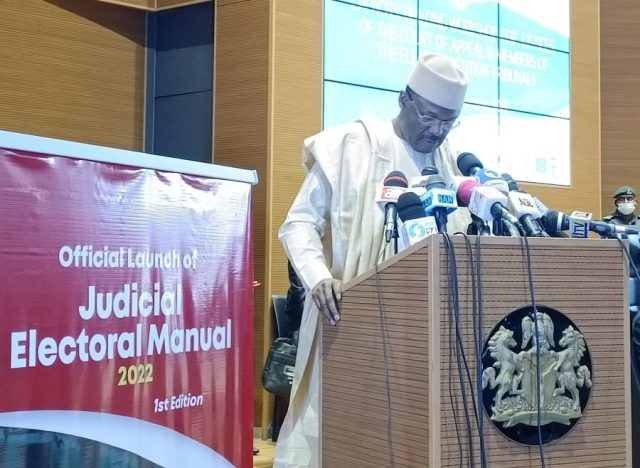

TUE, 08 NOV, 2022-theGBJournal| The Chairman of the Independent National Electoral Commission (INEC), Prof. Mahmood Yakubu said Monday that the Commission have been joined in about 600 cases relating to the conduct of recent primaries and nomination of candidates by political parties for the 2023 General Elections.
Another 70 Court Processes was served on the Commission in one day by a political party seeking to compel the Commission to accept the nomination or substitution of its candidate long after the deadline provided in the Timetable and Schedule of Activities for the 2023 General Election has elapsed.
The INEC boss made this disclosure at the Capacity building workshop for Justices of the Court of Appeal and Members of the Election Petition Tribunals ahead of the General election in Abuja.
According to Professor Yakubu, some of the cases will go up to the Supreme Court.
‘’The Implication is that we are still dealing with issues of nomination of candidates thereby eating into vital time for preparation of and procurement of sensitive material. It also means that the Courts will be dealing with the same issues long after the general elections,’’ he said.
INEC, Yakubu said, will continue to abide by Court orders but warned that ‘’a situation where a trial Court sought to vary the judgement of the Supreme Court by ordering the Commission to issue a Certificate of Return in favour of a candidate whose emergence during the party’s primary election has been nullified by the apex Court (and affirmed by the same Court following an application for clarification) put the Commission in a difficult situation.’’
The 2023 General Election will be held in 1, 491 constituencies made up of 1 Presidential Constituency, 28 Governorship elections, 109 Senatorial Districts, 360 Federal Constituencies (House of Representatives) and 993 State Constituencies (State House of Assembly).
Most significantly, it is the first general election since the repeal of the Electoral Act 2010 (as amended) and its re-enactment as the Electoral Act 2022.
The new Electoral Act contains eighty new provisions intended to improve the country’s elections and address some of the lacunae in the repealed Electoral Act 2010 (as amended), provide the legal backing to the technological innovations introduced by the Commission overtime.
Similarly, the new Electoral Act confers exclusive jurisdiction to hear pre-election cases on the on the Federal High Court with regards to candidate nomination in order to reduce forum shopping by litigants, abuse of court process and reduction in the spate of conflicting judgements by courts of coordinate jurisdiction.
Twitter-@theGBJournal| Facebook-The Government and Business Journal|email: gbj@govbusinessjournal.ng|govandbusinessj@gmail.com









